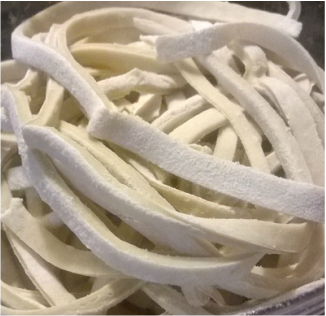Author References: Cooking From Scratch
 Homemade noodles that I made a few weeks ago. You can see the coating of flour. Have you ever developed a medieval- or pioneer-age story setting, and then tried to describe it? Wasn't easy, was it? There's a whole host of details to consider, and one step to understanding what it would be like would be understanding the complexity of cooking everything from scratch.
Homemade noodles that I made a few weeks ago. You can see the coating of flour. Have you ever developed a medieval- or pioneer-age story setting, and then tried to describe it? Wasn't easy, was it? There's a whole host of details to consider, and one step to understanding what it would be like would be understanding the complexity of cooking everything from scratch.In a medieval or pioneer style world, there would be very few items mass-produced for easy consumption. Those few items might be things like flour and sugar. Obviously there would be more than that, things like dried or salted meat and canned fruits and vegetables (if pioneer is what you're going for, anyway), but there wouldn't be things like instant noodles, frozen produce, or TV dinners.
I'm not going to go into what kinds of food would be likely in that kind of world (that would require a whole post, I think) because this is on cooking from scratch - the result of not having access to convenience foods. I'd like to go over every recipe you could possibly use in this situation, but I've had to face the facts. That's not possible, partially because there are an insane amount of recipes out there, and partially because even if I could manage to try them all, authors have a habit of stepping outside the box. You know, creating weird fruits, vegetables, and animals that don't actually exist, and therefore have no applicable recipes.
So, to solve this issue, my plan is to give you an idea of what cooking without convenience foods is like. Then you can apply that experience however you see fit. To get started, we'll take an example. Let's use a pasta dish.
Pasta is a favorite convenience food for many. It's easy to boil it in water and mix it with a canned or jarred tomato or creamy sauce. But what if you had to do it all from scratch, with ingredients like tomatoes, milk, flour, butter, spices, eggs?
My husband and I watch Naruto. A lot. The main character loves a dish called ramen, which is long noodles in a meat broth soup. So, naturally, I wanted to make it myself.
The soup recipe I use can take all day to cook. That's not an exaggeration. Here's a sample of the process:
Place meat (chicken or beef) in pot.
Fill with water and season with salt and garlic powder.
Place on stove, and heat to boiling. Reduce heat and simmer until meat is cooked through and tender.
Place portion of broth in smaller pan, and bring back to boiling.
Dice ginger and place in tea ball. Add peppercorns to tea ball.
Once broth is boiling, add tea ball, cinnamon stick, and white pepper. Steep for ten to fifteen minutes.
The third step is the longest, and takes hours. And this, of course, is not counting the noodles. The process for those goes something like this:
Mix water with kansui (alkaline water or salt; I use baking soda baked in the oven).
Add to flour and knead until hands and arms ache.
Set aside in damp cloth for at least half an hour.
Roll until thin, and slice into noodles with a knife.
If you don't have broth ready to use, or haven't mixed up and had the pasta dough setting under a damp cloth when you start, you're in for a long, hard process. This, ladies and gentlemen, is for one meal. And that's not even the full list of instructions. Nor does it cover the challenges.
The reason the pasta dough sits covered in a damp cloth? It's impossible to roll it out thin if you don't. It springs back on itself. Seriously. You also use a lot of flour for this. Why? Because the noodle dough is incredibly sticky, and you have to coat the entire work surface and rolling pin so it doesn't stick. And the kneading? Yes, you have to go until your arms ache. This can take time, and even then it may not be enough.
To make matters more interesting, this recipe assumes an electric stove, as well as the presence of all ingredients. I usually buy them at the store. A pioneer or medieval character, however, would find it more difficult. They may not have access to ginger, cinnamon sticks, or peppercorns at all. They may have to harvest garlic from a garden. They might have to use salted or cured meat rather than fresh. There's also the likelihood of them not being able to save any leftovers, due to absence of refrigeration. They may not have a tea ball, and would have to fish out the ingredients.
If you have a story set in a time where there are no convenience foods, even breakfast can be a challenge. You want eggs? Either you or a nearby neighbor better have chickens. Why? Because supermarkets are not a thing, and neither is refrigerated transportation. So if you want eggs for breakfast, you have to take care of those chickens first.
Want bread? Better learn substitutes for, or how to use, yeast. And how to knead that dough, how long and when it needs to rise, as well as how in the world you're supposed to cut nice, thin slices off the thing when you're done.
To help you out, I've compiled a list of from-scratch recipes for you to look at. Ideally, you should try them yourself if you want to describe it, BUT they do take a good amount of time, and looking at recipes and tips for them will at least give you something to work with:
Pioneer Bread
A list of pioneer recipes
A list of medieval recipes, translated
Orange marmalade
Gooseberry pudding
Brown onion soup
Macaroni with cheese
There are many other recipes you can search for online if your setting has different needs. If, for example, your setting is on a lake, you'll probably want to look at recipes for cooking fish. If you have fruits, vegetables, or meats that don't really exist, then they may also give you ideas for how your characters would use them. If, for example, you look at the recipe for orange marmalade, you could use something similar for another type of fruit that you made up.
One of the things you need to remember is that cooking only with base ingredients takes a lot of time and effort. If you want to have spaghetti and meatballs, and you don't have access to packaged spaghetti, you have to make it yourself. You'll also have to make the sauce from tomatoes and spices, as well as the meatballs. You can't have a pioneer or medieval character drive to the supermarket and buy a jar of sauce.
Like I said last week, if your characters don't have access to convenience foods, then there's got to be someone in every household whose job it is to keep everyone fed - and that's likely a full-time job. At the very least, you'll need some knowledge of what kinds of food they'll be eating. If your character does any cooking, however, you may need more details on how they're prepared.
What kinds of foods do you like to use in your writing?
Published on February 05, 2016 08:06
No comments have been added yet.



